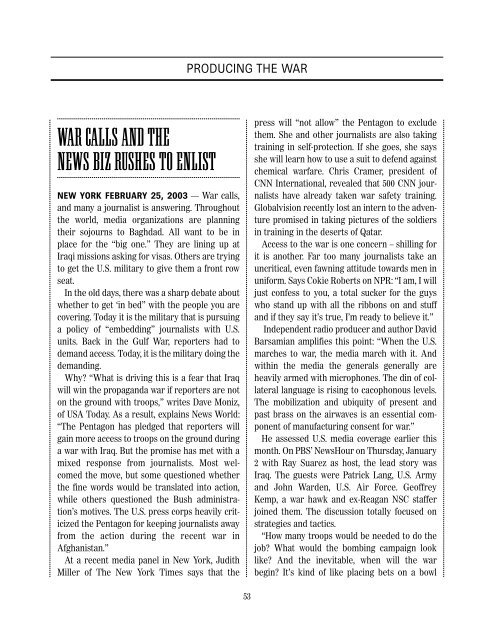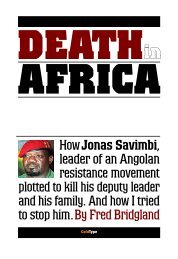UPDATED - ColdType
UPDATED - ColdType
UPDATED - ColdType
- TAGS
- updated
- coldtype
- coldtype.net
Create successful ePaper yourself
Turn your PDF publications into a flip-book with our unique Google optimized e-Paper software.
WAR CALLS AND THE<br />
NEWS BIZ RUSHES TO ENLIST<br />
NEW YORK FEBRUARY 25, 2003 — War calls,<br />
and many a journalist is answering. Throughout<br />
the world, media organizations are planning<br />
their sojourns to Baghdad. All want to be in<br />
place for the “big one.” They are lining up at<br />
Iraqi missions asking for visas. Others are trying<br />
to get the U.S. military to give them a front row<br />
seat.<br />
In the old days, there was a sharp debate about<br />
whether to get ‘in bed” with the people you are<br />
covering. Today it is the military that is pursuing<br />
a policy of “embedding” journalists with U.S.<br />
units. Back in the Gulf War, reporters had to<br />
demand access. Today, it is the military doing the<br />
demanding.<br />
Why? “What is driving this is a fear that Iraq<br />
will win the propaganda war if reporters are not<br />
on the ground with troops,” writes Dave Moniz,<br />
of USA Today. As a result, explains News World:<br />
“The Pentagon has pledged that reporters will<br />
gain more access to troops on the ground during<br />
a war with Iraq. But the promise has met with a<br />
mixed response from journalists. Most welcomed<br />
the move, but some questioned whether<br />
the fine words would be translated into action,<br />
while others questioned the Bush administration’s<br />
motives. The U.S. press corps heavily criticized<br />
the Pentagon for keeping journalists away<br />
from the action during the recent war in<br />
Afghanistan.”<br />
At a recent media panel in New York, Judith<br />
Miller of The New York Times says that the<br />
PRODUCING THE WAR<br />
53<br />
press will “not allow” the Pentagon to exclude<br />
them. She and other journalists are also taking<br />
training in self-protection. If she goes, she says<br />
she will learn how to use a suit to defend against<br />
chemical warfare. Chris Cramer, president of<br />
CNN International, revealed that 500 CNN journalists<br />
have already taken war safety training.<br />
Globalvision recently lost an intern to the adventure<br />
promised in taking pictures of the soldiers<br />
in training in the deserts of Qatar.<br />
Access to the war is one concern – shilling for<br />
it is another. Far too many journalists take an<br />
uncritical, even fawning attitude towards men in<br />
uniform. Says Cokie Roberts on NPR: “I am, I will<br />
just confess to you, a total sucker for the guys<br />
who stand up with all the ribbons on and stuff<br />
and if they say it’s true, I’m ready to believe it.”<br />
Independent radio producer and author David<br />
Barsamian amplifies this point: “When the U.S.<br />
marches to war, the media march with it. And<br />
within the media the generals generally are<br />
heavily armed with microphones. The din of collateral<br />
language is rising to cacophonous levels.<br />
The mobilization and ubiquity of present and<br />
past brass on the airwaves is an essential component<br />
of manufacturing consent for war.”<br />
He assessed U.S. media coverage earlier this<br />
month. On PBS’ NewsHour on Thursday, January<br />
2 with Ray Suarez as host, the lead story was<br />
Iraq. The guests were Patrick Lang, U.S. Army<br />
and John Warden, U.S. Air Force. Geoffrey<br />
Kemp, a war hawk and ex-Reagan NSC staffer<br />
joined them. The discussion totally focused on<br />
strategies and tactics.<br />
“How many troops would be needed to do the<br />
job? What would the bombing campaign look<br />
like? And the inevitable, when will the war<br />
begin? It’s kind of like placing bets on a bowl

















